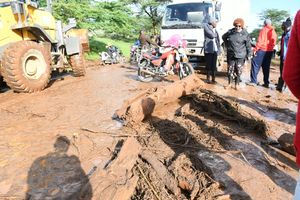ICC ruling will be Christmas gift or curse for Ocampo Six in chaos cases
The Ocampo Six might on December 24 know if they are being committed to full trial.
The Christmas Eve date was given by lawyers working for Pre-Trial Chamber II. (Read: Hague court processes keep many guessing on outcome of hearings)
This is the court, which will determine whether to send Deputy Prime Minister Uhuru Kenyatta, Civil service head Francis Muthaura, Postmaster-General Hussein Ali, MPs William Ruto and Henry Kosgey and broadcaster Joshua Sang to full trial for Kenya’s post-election violence.
Lawyers Gilbert Bitti and Mohamed El Zeidy were addressing a news conference after conclusion of confirmation of charges hearings for Mr Ruto, Mr Kosgey and Mr Sang.
The hearings for Mr Kenyatta, Mr Muthaura and Maj-Gen Ali are scheduled to start on September 21.
ICC Registrar Sylvana Arbia is expected in Nairobi next week to follow up the planned establishment of a liaison office in Kenya. One of the issues to be tackled is the diplomatic status of senior mission staff.
The lawyers said Judges Ekaterina Trendafilova, Hans-Peter Kaul and Cuno Tarfusser would assess evidence provided by the defence and prosecution to decide whether to proceed with the cases to trial.
But they refused to be drawn into discussions on whether the prosecution had been exposed for failure to carry out independent investigations and relied on NGO reports.
“All the evidence provided by both sides will be properly assessed by the judges in accordance with the law and they will make their decision,” said Mr Bitti.
They also hinted that anyone threatening witnesses could be punished by the court. According to the rules, the decisions of the court would have to be enforced by Kenya.
Throughout the hearings, defence lawyers and Mr Ruto, Mr Kosgey and Mr Sang maintained that they were innocent and that the alleged network, which supervised the killings and evictions did not exist.
The three were optimistic that they would be cleared of charges of murder, evictions and persecution.
Mr Ruto and Mr Kosgey produced media reports and helicopter logs to show they were at different campaign meetings when the prosecution claims they were distributing guns, grenades and gas cylinders or planning the violence.
But the prosecution countered that the two had access to helicopters and that they were within an hour’s flight from Eldoret, venue of the alleged meetings.
ICC Chief Prosecutor Luis Moreno-Ocampo, expressing confidence that he had water tight evidence against the three, said: “They are dead. Our evidence is solid,” when asked to respond to claims he did not carry out independent investigations.
The three defence teams and the prosecution office have until October 24 to file written submissions before the judges.
It is then that the 60-days countdown for the judges to make their ruling begin, though the chamber can vary the date through a ruling, the lawyers said.
Mr Biti and Mr El Zeidy insisted that the six Kenyan suspects would remain free men since they have cooperated with the court.
After confirmation of charges hearings, judges can send back the cases to the prosecutor for further investigations or commit some or all of the suspects to full trial.
They can also order the suspects freed but the prosecutor can still seek to open any of the cases by presenting fresh evidence.




